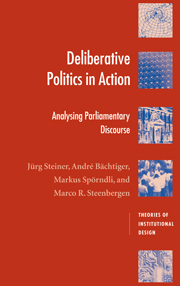Book contents
- Frontmatter
- Contents
- Acknowledgments
- Introduction: The research questions
- 1 Institutions and behavior: the example of consociational theory
- 2 The philosophical literature on deliberative politics
- 3 Measuring deliberation: a Discourse Quality Index
- 4 Understanding the real world of deliberation: hypotheses about antecedents and consequences
- 5 Antecedents of deliberation: institutions and issues
- 6 Discourse and its consequences
- Conclusion and research outlook
- Appendix: Discourse Quality Index (DQI): instructions for coders
- References
- Index
3 - Measuring deliberation: a Discourse Quality Index
Published online by Cambridge University Press: 22 September 2009
- Frontmatter
- Contents
- Acknowledgments
- Introduction: The research questions
- 1 Institutions and behavior: the example of consociational theory
- 2 The philosophical literature on deliberative politics
- 3 Measuring deliberation: a Discourse Quality Index
- 4 Understanding the real world of deliberation: hypotheses about antecedents and consequences
- 5 Antecedents of deliberation: institutions and issues
- 6 Discourse and its consequences
- Conclusion and research outlook
- Appendix: Discourse Quality Index (DQI): instructions for coders
- References
- Index
Summary
As we have seen in chapter 2, up to now the scholarly debate on the deliberative model has mainly taken place at a philosophical level. But we have also seen that there are important voices asking that the philosophical debate on deliberation should be supplemented with empirical investigations of real-life deliberations. In the present chapter, we take up this challenge.
Empirical studies on deliberation
There are already some studies in this direction. Some of them limit themselves to the formulation of hypotheses without testing them. Lascher (1996: 501) acknowledges explicitly in the title of his study that his is only a “Preface to Empirical Analysis.” With the focus on legislatures, he offers some indicators of how the quality of deliberation might be measured: for example, “whether arguments are framed in terms of some conception of the public good,” or whether “participants are able to critique each other's arguments and respond to such criticism.” Lascher then looks at factors promoting deliberation, hypothesizing, for example, that “legislative decisions will better meet deliberative standards when an issue is salient to constituents,” or “when there is greater uncertainty about the effects of different policy alternatives.” Lascher also presents hypotheses about possible consequences of deliberation: for example, “deliberation increases the legitimacy of legislators' decisions,” or “deliberation has cognitive benefits for participants, such as reducing erroneous judgments related to the policy issue in question.” Alluding to later empirical tests of his hypotheses, Lascher warns that “the required work will not be easy.”
- Type
- Chapter
- Information
- Deliberative Politics in ActionAnalyzing Parliamentary Discourse, pp. 43 - 73Publisher: Cambridge University PressPrint publication year: 2005



